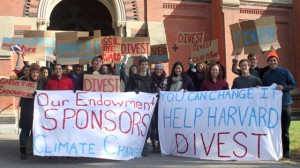This week, Bill spoke with two leaders of the climate change divestment movement that urges students to pressure universities into selling off their holdings in fossil fuels. On 300 campuses across the country, young people are doing just that and so far, nine colleges and universities have committed to divesting their endowments. Here, two student leaders of divestment movements — one at Harvard University and another at the University of California, Berkeley — talk about their experiences trying to bring about change at their schools, both with multi-billion dollar endowments.
If you’re a student active in such a campaign, use the comments section to share your experiences.
Chloe Maxmin on the Harvard student divestment campaign

I co-founded Divest Harvard at the start of my sophomore year, in the fall of 2012. We joined hundreds of other students across the country, becoming part of the fastest growing divestment movement in history. Our strategy is to stigmatize the fossil fuel industry and build a powerful mass movement. Our goal is to open political space for climate legislation.
Since the launch of our campaign, we have built a powerful movement on campus. At the college, 72 percent of students supported a referendum for divesting its $30 billion endowment. Harvard Law School students followed with 67 percent voting for divestment. More than 180 faculty and nearly 800 alumni have signed petitions in support of our campaign. On April 10, 2014 nearly 100 faculty members published a strongly worded letter in support of divestment addressed to President Faust and the Harvard Corporation. These efforts have attracted the world’s attention, while our administration refuses to engage in public dialogue. Harvard has recoiled from a leadership role in the defining crisis of our time: climate change.

More than 180 faculty and nearly 800 alumni have signed petitions in support of the Divest Harvard campaign. (Photo credit: Divest Harvard)
In October 2013, President Faust released a statement opposing fossil fuel divestment. She argued that the University would not divest because doing so would be a political act. We have responded by emphasizing that, if divestment is political, then investment is equally so. Indeed, there is no escape from the political, nor should there be.
Faust’s statement also advocated a strategy of shareholder involvement with the fossil fuel companies. Yet even shareholder activists acknowledge that you can’t engage with a company when you’re trying to change its fundamental business model. Faust claims that it is hypocritical to divest from fossil fuels as long as we rely on them in our daily lives. It’s true that we are all coerced into a cycle of carbon dependency. The challenge is to intervene in that cycle in order to reset the system on a new trajectory toward renewable energies.
This month, Harvard announced that it is signing onto the UN Principles for Responsible Investment and the Carbon Disclosure Project as well as creating a Climate Change Solutions Fund. We are gratified to see President Faust’s recognition that the University is accountable for the nature of its investments. However, these are weak efforts. The UN PRI benchmarks are wholly voluntary. The CDP focuses on shareholder engagement, which has not proved to be a successful strategy.
There’s a reason why thousands of students are rallying for divestment: we refuse to believe that a sustainable planet is beyond our reach. Though we did not choose this destiny, our lives are unavoidably defined by climate change. What we can choose is our response. We can insist that history know us not as passive victims but as the generation that chose to act. We fight from love and a passion for justice.
Ophir Bruck on UC Berkeley’s student vote on divestment

Bringing a resolution to the Graduate Assembly (GA) of the University of California, Berkeley, my first time navigating student government, deepened my commitment to fossil fuel divestment. What the GA Environmental Sustainability Committee members who sponsored the bill and I assumed would unfold as a smooth and painless show of support, turned out to be a lengthy process that revealed the more conservative nature of some of Berkeley’s graduate student community.
The resolution went up for a vote first in December 2013 and was tabled because of delegates’ concerns around the potential implications of divestment for the university’s endowment returns and, closer to home for the graduate students, research funding from fossil fuel companies. Over the next two months, I met with concerned graduate students wanting to discuss what divestment could mean for their department’s fossil fuel industry ties. One Ph.D. student told me that while in theory she supports divestment and the need to take a political and symbolic stand against the fossil fuel industry, in practice she is against any action that could potentially harm her or her department’s research funding.
The implications of fossil fuel divestment — and on a broader scale, of demanding a transition away from fossil fuels – should clearly be taken seriously. We’re not just talking about academic researchers poised to lose industry-funded grants in the transition away from fossil fuels. We’re talking about the groups and individuals most vulnerable to the massive structural shifts we are calling for: low wage earners, coal miners, migrant farm workers and the list goes on.

On February 6, 2014, UC Berkeley’s GA voted to support a resolution calling for the university to sell its shares in fossil fuel companies. (Photo credit: Mauricio D. Castillo)
We must be diligent in making sure our demands for climate action are matched by an actionable vision for alternatives that put people before corporate profits. We need to invest in and build a just and sustainable economy. An economy that is not based on exploitation and negative externalities, but on productivity and regeneration. One that is collectively liberating and that reflects the needs of everyone, especially the most vulnerable among us.
While it is true that some fossil fuel companies invest some money in alternatives, those investments are pittance in comparison to the amount of capital they expend on their bread and butter. The fact that the fossil fuel industry is funding our schools is profoundly problematic. It is no secret that industry-funded academic research is all-too-often dictated by industry agendas. Even if fossil fuel companies decided to invest heavily in renewables research and development — do we really want BP and Exxon to own our solar and wind power? A just transition means one that is to a decentralized, democratized and distributed energy system. It is about taking back our power by taking back our power.
On February 6, 2014, UC Berkeley’s GA voted to support a resolution calling for the university to sell its shares in fossil fuel companies. We will continue to push the UC Board of Regents, which determines the University of California’s investments, to divest its $11.2 billion endowment from fossil fuels. The Regents should not only stand on the right side of history by divesting, but by actively reinvesting in a transition to a clean and just economy. (Read the full essay.)

